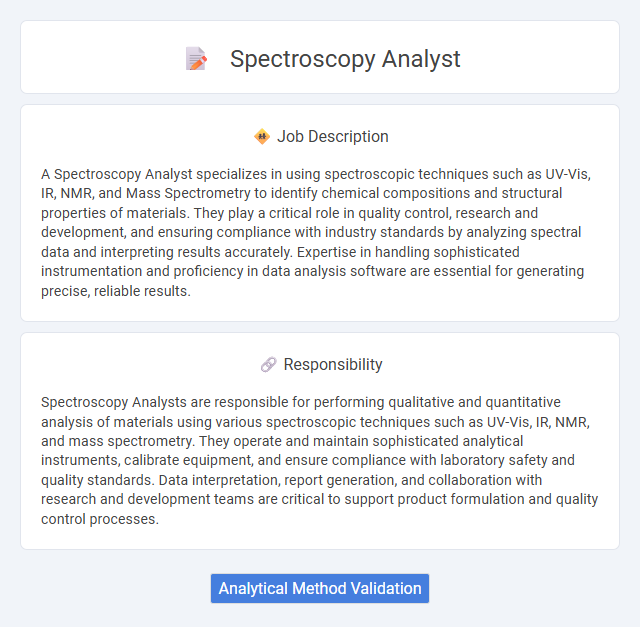
A Spectroscopy Analyst specializes in using spectroscopic techniques such as UV-Vis, IR, NMR, and Mass Spectrometry to identify chemical compositions and structural properties of materials. They play a critical role in quality control, research and development, and ensuring compliance with industry standards by analyzing spectral data and interpreting results accurately. Expertise in handling sophisticated instrumentation and proficiency in data analysis software are essential for generating precise, reliable results.
People with strong analytical skills and a keen attention to detail will likely thrive as Spectroscopy Analysts, as the role demands precise interpretation of spectral data. Those comfortable working in lab environments and handling complex instrumentation may find this position suitable due to the technical nature of the tasks. Individuals prone to impatience or discomfort with repetitive procedures might struggle to adapt effectively to the consistent data analysis required in this job.
Qualification
A Spectroscopy Analyst typically requires a bachelor's degree in chemistry, physics, or a related scientific field, with hands-on experience in spectroscopic techniques such as UV-Vis, IR, NMR, or Mass Spectrometry. Proficiency in data analysis software and strong understanding of chemical properties and molecular interactions are essential for accurate interpretation of spectral data. Advanced qualifications, including a master's degree or certifications in analytical methods, enhance the ability to conduct research and support product development in pharmaceutical, environmental, or materials science industries.
Responsibility
Spectroscopy Analysts are responsible for performing qualitative and quantitative analysis of materials using various spectroscopic techniques such as UV-Vis, IR, NMR, and mass spectrometry. They operate and maintain sophisticated analytical instruments, calibrate equipment, and ensure compliance with laboratory safety and quality standards. Data interpretation, report generation, and collaboration with research and development teams are critical to support product formulation and quality control processes.
Benefit
A Spectroscopy Analyst position likely offers significant benefits including access to advanced analytical technologies and opportunities for skill development in spectral data interpretation. This role may provide a collaborative work environment that fosters innovation and continuous learning, enhancing professional growth. Competitive compensation packages and potential career advancement in research or quality control sectors are also probable benefits.
Challenge
Working as a Spectroscopy Analyst likely involves navigating complex data interpretation challenges with precision and attention to detail. Handling intricate instrumentation and consistently ensuring accurate results may require advanced problem-solving skills and adaptability. The role probably demands staying updated with evolving technologies to overcome experimental and analytical uncertainties effectively.
Career Advancement
Spectroscopy Analysts specializing in techniques such as NMR, FTIR, and UV-Vis spectroscopy gain critical expertise in material characterization, enhancing their value in pharmaceutical, chemical, and environmental sectors. Mastery of advanced data interpretation and instrumentation calibration enables progression to senior analyst roles, project management, or research and development leadership. Continuous skill development in emerging spectroscopic technologies positions professionals for higher responsibilities and industry-recognized certifications.
Key Terms
Analytical Method Validation
A Spectroscopy Analyst specializing in Analytical Method Validation ensures the accuracy, precision, and reliability of spectroscopic techniques used for qualitative and quantitative analysis in pharmaceutical and chemical industries. They develop, validate, and implement robust methods compliant with regulatory guidelines such as ICH Q2(R1), performing thorough risk assessments and stability studies to guarantee consistent performance. Expertise in UV-Vis, FTIR, NMR, and Raman spectroscopy coupled with data interpretation and troubleshooting skills optimizes analytical workflows and enhances product quality control.
 kuljobs.com
kuljobs.com